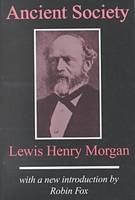
Ancient Society
Seiten
2000
Transaction Publishers (Verlag)
978-0-7658-0691-8 (ISBN)
Transaction Publishers (Verlag)
978-0-7658-0691-8 (ISBN)
- Titel ist leider vergriffen;
keine Neuauflage - Artikel merken
In this text, Victorian intellectual Lewis Henry Morgan defines three major stages in the cultural and social evolution of mankind. In his introduction, Robin Fox reviews Morgan's thesis in the light of what we have learned in the 20th century.
Lewis Henry Morgan (1818-1881) was a remarkable Victorian, justly compared with two other giant intellects of his age, Charles Darwin and Herbert Spencer. All three were conventional men, but they all developed theories with radical and revolutionary implications. All were concerned with "evolution" in one form or another, putting them in conflict with religious and intellectual orthodoxy. Morgan believed it both natural and proper to learn by what stages of growth mankind had risen from savagery to civilization.
In his important new introduction, Robin Fox reviews the developmental and social evolutionary thesis put forward by Morgan in light of what we have learned from the twentieth century. Ancient Society defines three major stages in the cultural and social evolution of mankind. Morgan describes how savages, advancing by definite steps, attained the higher condition of barbarism. He then explores how barbarians, by similar progressive advancement, finally attained civilization. Finally he discusses why other tribes and nations have been left behind in the race of progress. Inventions and discoveries show the similarity of human wants at the same stages of advancement, thus demonstrating the psychic unity of mankind. The idea of property-now an obsession in civilized society-underwent a similar process of growth and development, as did the principles of government. By the "comparative method" of using existing and historical societies as examples of previous stages, the history of human progress could be reconstructed. These parallel lines along the pathways of human progress form the principal subjects of discussion in Ancient Society.
In his opening statement Robin Fox argues that social science was wrong to dismiss the comparative method, and paid a great price in the fragmentation of the unity of purpose that Morgan's method provided. Ancient Society's great cultural import with its lasting wisdom will be of interest to scholars and students in the social sciences and all those interested in the question of the unity of the sciences of mankind.
Robin Fox is University Professor of Social Theory at Rutgers University. His books include Conjectures and Confrontations, Reproduction and Succession, The Challenge of Anthropology, and Encounter with Anthropology, all available from Transaction.
Lewis Henry Morgan (1818-1881) was a remarkable Victorian, justly compared with two other giant intellects of his age, Charles Darwin and Herbert Spencer. All three were conventional men, but they all developed theories with radical and revolutionary implications. All were concerned with "evolution" in one form or another, putting them in conflict with religious and intellectual orthodoxy. Morgan believed it both natural and proper to learn by what stages of growth mankind had risen from savagery to civilization.
In his important new introduction, Robin Fox reviews the developmental and social evolutionary thesis put forward by Morgan in light of what we have learned from the twentieth century. Ancient Society defines three major stages in the cultural and social evolution of mankind. Morgan describes how savages, advancing by definite steps, attained the higher condition of barbarism. He then explores how barbarians, by similar progressive advancement, finally attained civilization. Finally he discusses why other tribes and nations have been left behind in the race of progress. Inventions and discoveries show the similarity of human wants at the same stages of advancement, thus demonstrating the psychic unity of mankind. The idea of property-now an obsession in civilized society-underwent a similar process of growth and development, as did the principles of government. By the "comparative method" of using existing and historical societies as examples of previous stages, the history of human progress could be reconstructed. These parallel lines along the pathways of human progress form the principal subjects of discussion in Ancient Society.
In his opening statement Robin Fox argues that social science was wrong to dismiss the comparative method, and paid a great price in the fragmentation of the unity of purpose that Morgan's method provided. Ancient Society's great cultural import with its lasting wisdom will be of interest to scholars and students in the social sciences and all those interested in the question of the unity of the sciences of mankind.
Robin Fox is University Professor of Social Theory at Rutgers University. His books include Conjectures and Confrontations, Reproduction and Succession, The Challenge of Anthropology, and Encounter with Anthropology, all available from Transaction.
| Verlagsort | Somerset |
|---|---|
| Sprache | englisch |
| Themenwelt | Geschichte ► Teilgebiete der Geschichte ► Kulturgeschichte |
| Geschichte ► Teilgebiete der Geschichte ► Sozialgeschichte | |
| Naturwissenschaften ► Biologie ► Evolution | |
| Sozialwissenschaften ► Ethnologie | |
| Sozialwissenschaften ► Soziologie | |
| ISBN-10 | 0-7658-0691-6 / 0765806916 |
| ISBN-13 | 978-0-7658-0691-8 / 9780765806918 |
| Zustand | Neuware |
| Haben Sie eine Frage zum Produkt? |
Mehr entdecken
aus dem Bereich
aus dem Bereich
der stille Abschied vom bäuerlichen Leben in Deutschland
Buch | Hardcover (2023)
C.H.Beck (Verlag)
23,00 €
vom Mittelalter bis zur Gegenwart
Buch | Softcover (2024)
C.H.Beck (Verlag)
12,00 €


